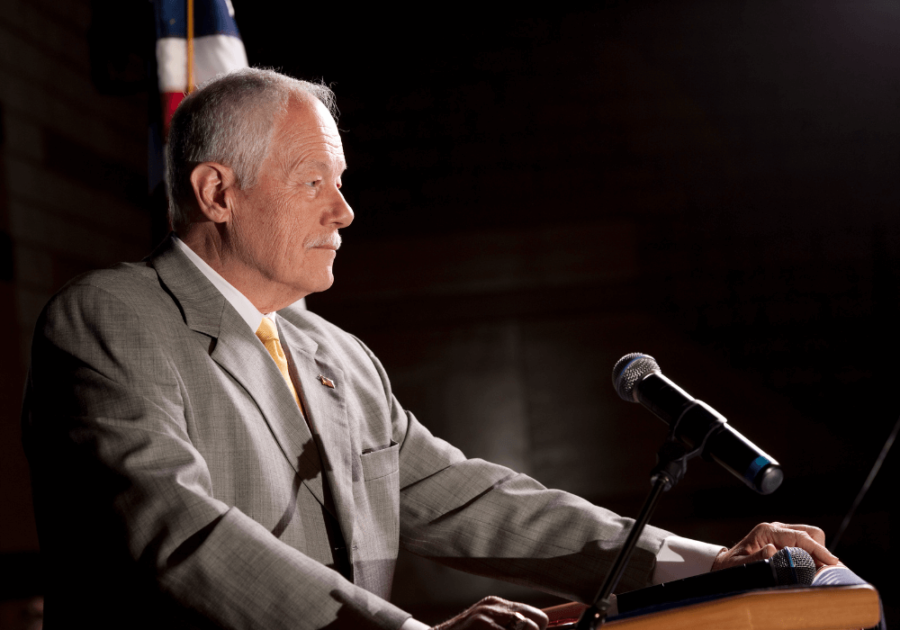What once totally disqualified a candidate for president now gets him a standing ovation and the keys to the kingdom.

There was a time when being a bully or a con man (not to mention a convicted felon) would’ve ended a political career overnight. Now, it seems like it gets you a fanbase.
Millions of Americans have watched a leader mock, lie, cheat, and belittle—and instead of walking away, they double down. They defend, excuse, even cheer. It’s not just about policies or party lines anymore. It’s about identity, resentment, and the desire to see someone “stick it” to the system, no matter the cost.
There’s something deeply unsettling about watching cruelty be reframed as strength, manipulation as strategy, and ego as authenticity. You start to wonder what this says about us as a country—what we’ve accepted, what we’ve stopped expecting, and who we’ve become willing to follow. It’s not just one man. It’s the millions who see him clearly and still say, “That’s my guy.” That’s the part that hits hardest.
1. A bully looks strong to people who feel powerless.

When life feels out of control—jobs disappearing, prices climbing, futures uncertain—a loud, aggressive figure can feel oddly comforting. A bully doesn’t second-guess, doesn’t apologize, and doesn’t seem rattled. For people who feel ignored or overlooked, that kind of certainty looks like leadership. It’s not about policy or truth.
It’s about emotion. A bully speaks with force, and that force feels like protection, even when it’s just noise. People want someone who seems like they’ll fight for them, even if they never actually do.
In the eyes of the frustrated and disillusioned, a man who insults his enemies and steamrolls his critics comes off as fearless. It doesn’t matter if it’s reckless—what matters is that he “wins.” When you feel like the world’s stacked against you, the bully becomes your battering ram, according to experts at Psychology Today. His cruelty feels like strength, and for some, that’s enough.
2. Many voters mistake confidence for competence.

It’s easy to assume the loudest guy in the room knows what he’s doing. A confident tone, a firm handshake, a quick answer—these things create the illusion of control, even when the facts don’t back it up. A con man knows this and plays it perfectly. He doesn’t pause to fact-check himself or show doubt, which convinces people he’s got it all figured out.
They assume no one could be that bold without knowing something the rest of us don’t. This is how image overtakes substance. People want to feel like their leader has a plan, even if he’s making it up as he goes, say writers in an article for the New York Times.
In a culture that celebrates “fake it till you make it,” the con man thrives. He’s not actually solving problems, but he sounds like he could—so voters project competence onto him, even when he’s in over his head.
3. The con man tells people exactly what they want to hear.

A skilled manipulator doesn’t offer hard truths. He offers flattering lies. He says you’re the “real Americans.” He says the problems aren’t your fault—they’re someone else’s. He makes you feel seen, validated, even heroic.
For many, that’s more appealing than hearing how complicated the world really is. The con man promises simple solutions to complex issues, and people eat it up because nuance feels exhausting, writes Calvin Woodward in an Associated Press article. He tells them they’re victims, but also that they’re winners.
He blames outsiders, elites, the press—anyone but his audience. This formula works because it doesn’t challenge anyone’s worldview. It confirms it. That kind of validation feels good, even addictive.
People stop questioning the message because it’s delivering something they crave: belonging and blame in a tidy package. The truth gets blurry when a lie feels this comforting.
4. People are drawn to chaos when they’ve lost faith in the system.

When institutions fail—when schools don’t teach, healthcare costs crush, and wages stagnate—people stop believing in rules, facts, or “the way things are supposed to work.” They don’t want a polished statesman. They want someone who kicks over the table.
A bully who causes chaos doesn’t scare them—he speaks to their frustration. If the system hasn’t worked for them in decades, why defend it? So when a con man storms in, ignoring every norm and breaking every rule, it feels satisfying, according to a poll published in the Washington Post. He becomes the wrecking ball they never knew they wanted.
The mess he leaves behind doesn’t bother them because they didn’t believe in the structure to begin with. It’s easier to cheer for the guy flipping the chessboard than to admit the game was rigged all along. Chaos, to some, feels like a fresh start—even if it burns everything down in the process.
5. He reflects the anger many people are too afraid to express.

A lot of people are walking around furious—at their job, their finances, the government, the world. But they’ve been told to stay polite, stay quiet, stay civil. Then along comes a man who says every outrageous thing they wish they could. He breaks the rules, mocks his enemies, and never apologizes.
He doesn’t bottle up his rage—he unleashes it. For many, that’s cathartic. Watching him rip into the press, insult opponents, or lash out on social media feels like emotional revenge. He becomes a vessel for their resentment. It’s not that they admire the cruelty. It’s that they’ve internalized so much of their own anger, they’re grateful to see someone spit it back out without consequence.
That rage feels empowering when you’ve felt voiceless for too long. The vindication becomes their emotional proxy—saying the things they don’t dare but secretly cheer for.
6. Tribal loyalty is stronger than character flaws.

Politics has become more about identity than ideas. For many, supporting their political “side” feels like supporting their entire belief system, their community, their culture. So when their chosen leader does something cruel, dishonest, or reckless, they defend him—not because they agree, but because admitting fault would feel like betrayal.
In this tribal mindset, the intimidator isn’t evaluated on character. He’s judged on loyalty to the tribe. He can lie, mock, or threaten, and people will still stick by him if they see him as “one of us.” It’s no longer about right or wrong. It’s about us vs. them. Every attack against him feels like an attack on the people who support him.
So they circle the wagons. They make excuses. They lower the bar. Because admitting he’s not the hero would mean rethinking everything—and that’s harder than just holding the line.
7. Many believe toughness matters more than decency.

In a culture that often values dominance over diplomacy, the man who looks like he can “win the fight” tends to win the vote. Decency, empathy, or kindness? Those traits are dismissed as weak. People have been sold on the idea that the world is so broken, only a ruthless leader can fix it.
So when someone leads with aggression and disdain, it feels like strength—even when it’s clearly toxic. The bully appeals to this belief by turning every situation into a competition or a showdown. He doesn’t compromise; he conquers. He doesn’t unite; he defeats. This mentality fuels the idea that being “tough” justifies everything else.
Some voters see politics as a street fight, and they want the guy who throws the hardest punches—no matter who gets hurt. In their eyes, strength wins over substance, every time.
8. He offers simple enemies and clear scapegoats.

One of the oldest tricks in the con man playbook is to blame “them”—immigrants, the media, other countries, the elites. The list changes, but the effect is the same. He gives his followers a target. When life feels overwhelming and complex, having a clear enemy feels like clarity. It organizes chaos into something that feels manageable. You don’t have to examine systems or look inward.
You just blame them. The intimidator thrives on this tactic. It’s emotionally satisfying to believe that someone else is responsible for your struggles—and even more satisfying when your leader promises to punish them. This is how prejudice gets repackaged as patriotism and cruelty gets mistaken for justice.
People rally behind it because it gives them something to fight against instead of something to understand. That’s a powerful distraction—and the con man knows it.
9. Many see his flaws as proof that he’s “real.”

Some people admire the tyrant because he’s not polished. He doesn’t sound like a politician. He talks off the cuff, makes mistakes, shows zero filter. To his supporters, this makes him authentic—even when he’s lying.
Ironically, the very behaviors that would disqualify most people from leadership are what make him appealing. His rough edges, contradictions, and crude language get reframed as “telling it like it is.” Supporters claim he’s just being honest, just being human.
In a political world full of scripted speeches and photo ops, his rawness feels refreshing to them. They mistake unpredictability for transparency. The con man benefits from this illusion of honesty, even when he’s spinning falsehoods.
His flaws become part of the brand—so calling them out doesn’t hurt him. It reinforces the myth that he’s different, unfiltered, and somehow more trustworthy than anyone who acts “too presidential.”
10. He makes his supporters feel like they’re winning.

Even when nothing improves, the bully’s tone makes it sound like progress. He mocks opponents, claims victory constantly, and spins every setback as someone else’s fault. Supporters don’t always need actual wins—they need the feeling of winning. That illusion becomes its own kind of comfort. In a world that often makes people feel small or forgotten, the intimidator offers them pride by association.
When he “owns the libs,” they cheer. When he fights with the press, they feel like they’re fighting back too. His rise becomes their revenge. This emotional payoff is powerful. It fills a void that policy rarely does. The con man doesn’t deliver real change, but he delivers the vibe of dominance. For many voters, that’s enough to keep the loyalty going—even if their lives don’t get any better.
11. Outrage fatigue makes people stop caring about the lies.

When someone behaves badly enough, often enough, people eventually tune it out. That’s the trick. The con man overwhelms the public with scandals, insults, and drama until it all blurs together. Supporters stop fact-checking, stop reacting, and start dismissing everything as “just more noise.”
It’s not that they believe everything he says—it’s that they’re too tired to keep up. Outrage fatigue sets in, and once that happens, standards drop. What once would’ve been a career-ending scandal becomes “just how he is.” The sheer volume of lies and offenses works in his favor. He makes it impossible to stay shocked, so people stop expecting better. The con man thrives in that numbness.
As long as supporters don’t care enough to hold him accountable, he keeps going—louder, bolder, and more reckless than before.
12. For some, the cruelty is the point.

This is the darkest reason of all. Some people don’t just tolerate the cruelty—they enjoy it. They see his insults, his mockery, his disdain, and they laugh. It’s entertaining. It feels like justice. It makes them feel superior. For them, politics isn’t about policy—it’s about power plays.
Hurting the people they dislike becomes the goal, not the side effect. When the tyrant targets the vulnerable or the different, it confirms their own biases. When he breaks the rules, they cheer because it offends the people they hate. In this worldview, empathy is weakness and cruelty is a form of strength. That’s why no scandal, no apology, no moral failing ever really sticks.
The behavior isn’t disqualifying—it’s the brand. For those who feel unseen or resentful, watching someone else get put down feels like finally being lifted up. It’s not just tolerated. It’s enjoyed.
